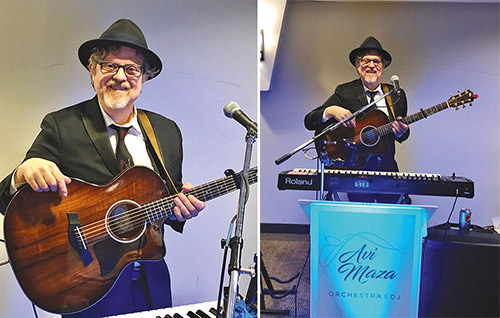
When weddings and bar mitzvahs “as we knew them” resume, families might find themselves sitting at a reception and marveling at the talents of a certain singer who movingly sings Dror Yikra, Oseh Shalom and other classics.
Audiences might not be surprised to see that the singer intuitively grasps how simcha music not only entertains but uplifts listeners; they probably would be surprised to learn that this musician, Rob Taube of New York City, a leading member of the Avi Maza Orchestra, is not Jewish.
Taube, a self-described “Goy Boy From Illinois,” grew up in a musical family in Urbana-Champaign. His father, an aerospace products salesman, was a talented pianist, as was his grandmother. He fondly recalled family gatherings, watching his grandmother’s left hand bouncing around the piano keys as the family sang songs like Winter Wonderland and Frosty the Snowman.
In his teens, Taube took up the guitar and started playing rock and roll favorites. His family moved to Detroit and, after completing high school, he found his way into a rock band called Scratch, which performed cover songs and some original music in area bars.
Looking for new horizons, Taube moved to the city in 1987, and soon found a job as part of the house band at Cafe Feenjon, a landmark nightclub. The club had a mixed audience and played a wide range of music, including favorites in Russian, Arabic, Yiddish, Hebrew and Greek. Taube, a quick study, soon developed a working grasp of the musical styles and lyrics of each blend of music. The performance schedule expedited his mastery of the music; he often played six nights a week, five 45-minute sets a night. He referred to it as “incredible on the job training.”
During that time, he developed close ties with a Jewish family, the Gamms. He rented an apartment in one of the properties they owned in Brooklyn. He also visited with the family matriarch, Sonya, who taught him how to sing Yiddish classics like Yiddishe Momme, Shayn Vi Di L’Vone, and Rumenye, Rumenye.
After a few years, Taube grew interested in broadening his experiences. He earned a degree in journalism at Brooklyn College in 1999 and worked for a time at the New York Post. But the music drew him back and he started playing in bands at weddings and bar mitzvahs. He received a call from someone at the renowned Sammy’s Roumanian Steakhouse restaurant and joined its house band, working there for nearly a decade. He continued to play at life cycle events as well.
In the early 2000s he met Avi Maza, founder and director of the Avi Maza Orchestra. Maza enlisted Taube for his band and introduced him to a new set of opportunities for musical performance—singing a cappella at simchas on Shabbat. He immediately took to the format, enjoying how he and others in a small group of singers could simulate an entire band with human voices.
Maza also introduced Taube to the facets of observant Jewish life. Taube was fascinated to see that Maza would walk for miles on Shabbat to perform at a simcha and forgo all electrical equipment for the 25-hour period.
Taube grew to become a mainstay of the orchestra, performing “almost every Saturday afternoon” in their a cappella bookings, a few times a month in their simcha bookings, and once a month or so in events at senior centers, where his Yiddish repertoire was particularly well received.
And then the pandemic hit and all live musical performances were cancelled. Taube recalled their last engagement, in a shul in Westchester in the days before the closure.
What could a seasoned musician do now, in such circumstances. Fortunately, Taube had a backup plan that proved very viable.
Around 2005 Taube started giving music lessons, just to create some steady income. The lessons grew and slowly became his “main gig.” He founded the Groove Garden in New York City as a center for teaching music along with its own professional grade recording studio. When the pandemic hit, Groove Garden went to online lessons and lost almost none of its students while gaining a few in far flung places like California, Colorado and Connecticut. As the precautions eased in recent months, some students have returned to in-person tutorials, encouraged by the studio’s serious measures to discourage the spread, which include open windows, upgraded ventilation and use of hand sanitizer.
Taube remains active in the music field, now largely parlaying his talents as a singer/songwriter, guitarist, keyboardist and drummer into success as a musical tutor and studio director with five other tutors. But he misses his work in the Jewish community and hopes to see it return in the months ahead.
Asked about what he observed in the Jewish community that drew him to it, Taube spoke about his admiration of “the warmth and sense of humor, while carrying the weight of historical experience.” He credits this form of humor, which inspires resilience, with helping him through a rough patch last year when both of his parents passed away.
Maza is eagerly awaiting the resumption of live simcha performances and the return of Taube to his band.
“I thoroughly enjoy having Rob in our entertainment group,” he said. “Whether it’s with our live band or our a cappella singers, Rob’s versatility is unmatched. And he’s the only musician I know who is equally comfortable singing classic rock as well as authentic Yiddish!”
For more information on Groove Garden, please visit www.groovegarden.net.
By Harry Glazer








